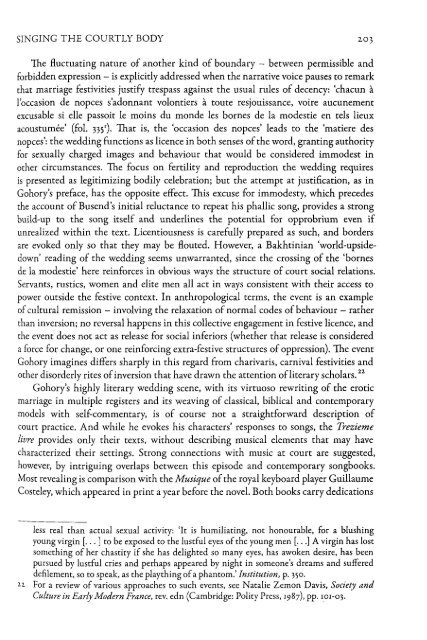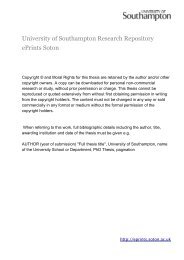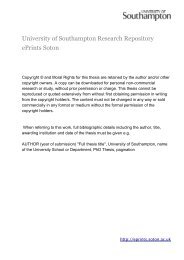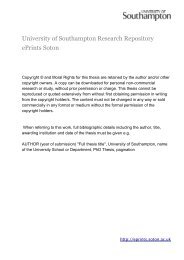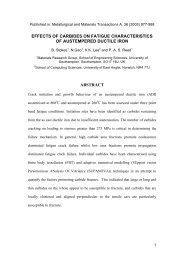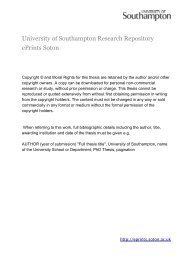obscenites renaissantes - ePrints Soton - University of Southampton
obscenites renaissantes - ePrints Soton - University of Southampton
obscenites renaissantes - ePrints Soton - University of Southampton
You also want an ePaper? Increase the reach of your titles
YUMPU automatically turns print PDFs into web optimized ePapers that Google loves.
SINGING THE COURTLY BODY 203<br />
The fluctuating nature <strong>of</strong> another kind <strong>of</strong> boundary - between permissible and<br />
forbidden expression - is explicitly addressed when the narrative voice pauses to remark<br />
that marriage festivities justify trespass against the usual rules <strong>of</strong> decency: 'chacun a<br />
I'occasion de nopces s'adonnant volontiers a toute resjouissance, voire aucunement<br />
excusable si elle passoit le moins du monde les bornes de la modestie en tels lieux<br />
acoustumee' (fol. 335'). That is, the 'occasion des nopces' leads to the 'matiere des<br />
nopces': the wedding functions as licence in both senses <strong>of</strong> the word, granting authority<br />
for sexually charged images and behaviour that would be considered immodest in<br />
other circumstances. The focus on fertility and reproduction the wedding requires<br />
is presented as legitimizing bodily celebration; but the attempt at justification, as in<br />
Gohory's preface, has the opposite effect. This excuse for immodesty, which precedes<br />
the account <strong>of</strong> Busend's initial reluctance to repeat his phallic song, provides a strong<br />
build-up to the song itself and underlines the potential for opprobrium even if<br />
unrealized within the text. Licentiousness is carefully prepared as such, and borders<br />
are evoked only so that they may be flouted. However, a Bakhtinian 'world-upsidedown'<br />
reading <strong>of</strong> the wedding seems unwarranted, since the crossing <strong>of</strong> the 'bornes<br />
de la modestie' here reinforces in obvious ways the structure <strong>of</strong> court social relations.<br />
Servants, rustics, women and elite men all act in ways consistent with their access to<br />
power outside the festive context. In anthropological terms, the event is an example<br />
<strong>of</strong> cultural remission - involving the relaxation <strong>of</strong> normal codes <strong>of</strong> behaviour - rather<br />
than inversion; no reversal happens in this collective engagement in festive licence, and<br />
the event does not act as release for social inferiors (whether that release is considered<br />
a force for change, or one reinforcing extra-festive structures <strong>of</strong> oppression). The event<br />
Gohory imagines differs sharply in this regard from charivaris, carnival festivities and<br />
other disorderly rites <strong>of</strong> inversion that have drawn the attention <strong>of</strong> literary scholars.<br />
Gohory's highly literary wedding scene, with its virtuoso rewriting <strong>of</strong> the erotic<br />
marriage in multiple registers and its weaving <strong>of</strong> classical, biblical and contemporary<br />
models with self-commentary, is <strong>of</strong> course not a straightforward description <strong>of</strong><br />
court practice. And while he evokes his characters' responses to songs, the Trezieme<br />
livre provides only their texts, without describing musical elements that may have<br />
characterized their settings. Strong connections with music at court are suggested,<br />
however, by intriguing overlaps between this episode and contemporary songbooks.<br />
Most revealing is comparison with the Musique <strong>of</strong> the royal keyboard player Guillaume<br />
Costeley, which appeared in print a year before the novel. Both books carry dedications<br />
less real than actual sexual activity: 'It is humiliating, not honourable, for a blushing<br />
young virgin [... ] to be exposed to the lustful eyes <strong>of</strong> the young men [...] A virgin has lost<br />
something <strong>of</strong> her chastity if she has delighted so many eyes, has awoken desire, has been<br />
pursued by lustful cries and perhaps appeared by night in someone's dreams and suffered<br />
defilement, so to speak, as the plaything <strong>of</strong> a phantom.' Institution, p. 350.<br />
For a review <strong>of</strong> various approaches to such events, see Natalie Zemon Davis, Society and<br />
Culture in Early Modern France, rev. edn (Cambridge: Polity Press, 1987), pp. 101-03.


